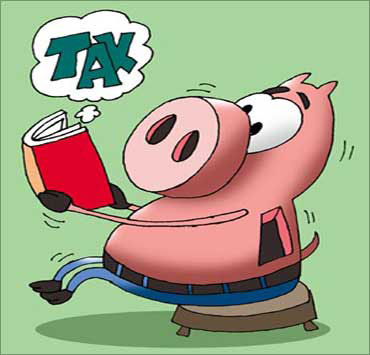 | « Back to article | Print this article |
Service tax on new homes: What it means to YOU
Investments in real estate have just got a bit costlier. Since April 2010, an additional amount in the form of service tax is being collected from buyers, on under construction properties. So what is this service tax and who is deemed to pay it? Investment Yogi explores the applicability and impact of this new tax, being levied on property buyers.
Service tax on property purchase: What is it?
In the Union Budget of 2010, the Finance Minister introduced a service tax of 10.3 per cent on all under construction property purchases from a builder or developer.
The government has stipulated that construction of a house by a builder in a complex, in any form, whether it is an apartment, row house, flat or a duplex is deemed as a 'service' and therefore taxable.
This service tax is to be paid by property buyers, to the builders, who would in turn deposit the amount to the tax authorities. For a buyer, thus, the additional service tax would push the cost of her/his home by a few more lakhs.
5 key points: What you actually need to pay for
The following points briefly describe the applicability of the service tax and what investors actually need to pay for:
1. Tax on under construction properties only
Service tax is applicable only on purchase of under construction properties. A property is deemed to be under construction, till the builder receives a completion certificate from the local municipal authorities for the same. Therefore, if a buyer pays the complete amount for the property, after the builder has received the completion certificate for her/his complex, no service tax would be applicable for the buyer.
2. Abatement allowed
This tax is applicable only on 25 per cent of the construction value -- abatement, in tax parlance, refers to a portion of the value of the taxable service, which would be exempt, as per a government notification.
As per the government abatement scheme, under notification 1/2006 dated March 1, 2006, a contractor is entitled to claim abatement to the extent of 67 per cent of the value of services rendered by her/him, which would be exempt from tax. This amount quoted by developers is towards cost of land and materials. The balance 33 per cent amount is considered as 'service' provided, hence taxed.
However, the Finance Minister has recently increased the abatement from 67 per cent to 75 per cent.
Service tax, therefore, would be on 25 per cent of the value of the property and not on the entire cost. Tax would be applicable only on the cost of labour or services of the builder or developer. All costs of land and construction material of the property would not fall under the purview of service tax.
3. Resale properties
There would be no service tax on resale properties. As service tax is applicable only on under construction properties which has not yet received a completion certificate, resale properties do not attract any service tax as they already would have obtained a completion certificate.
Parking slots or garage of properties: Along with the apartment or flat, builders also sell parking slots to buyers. No service tax would be applicable for the amount paid for such parking slots.
4. Preferential location services
Builders many times will build internal roads, pavements, or maintain gardens for the development of the property complex. Such services would attract a service tax. Also any additional amount paid for a floor rise, an apartment with a specific number or a specific direction, apartment facing either a park, pool or sea, would cost the buyer a service tax.
5. Low cost housing segment
In recent months, the real estate industry has developed various affordable properties worth less than Rs 20 lakhs (Rs two million) for the lower and middle income group. Properties belonging to this low cost housing segment would be exempt from service tax.
A final word
Most individuals buy properties before they are near completion, primarily because payments would be required on the basis of the stages of completion, thus reducing any liquidity woes. Since most property buyers consider buying a property which is still under construction or in the final stages, this service tax is surely to burden them.
Another point to be noted is the fact that the division of construction costs versus labour costs is undertaken by the builder on his own accord and is subject to being under his terms. The ultimate burden, thus, is on the buyer in the form of higher costs for his new home.



